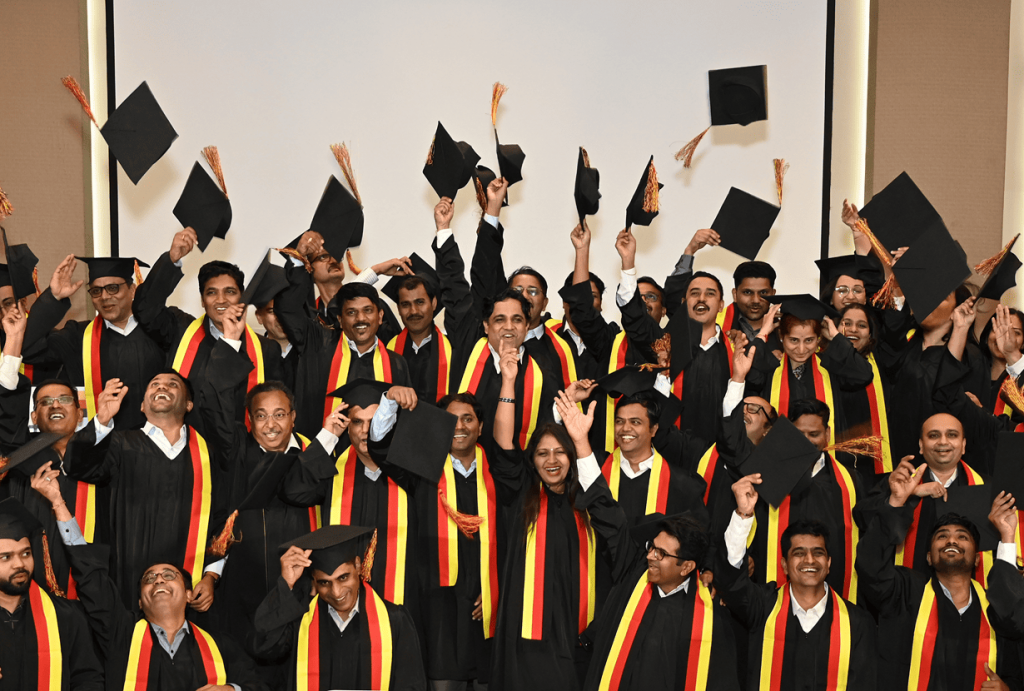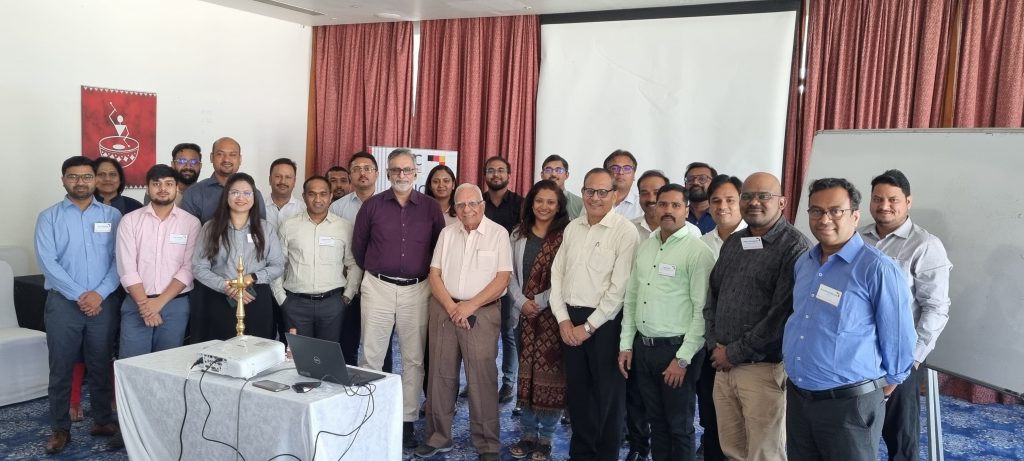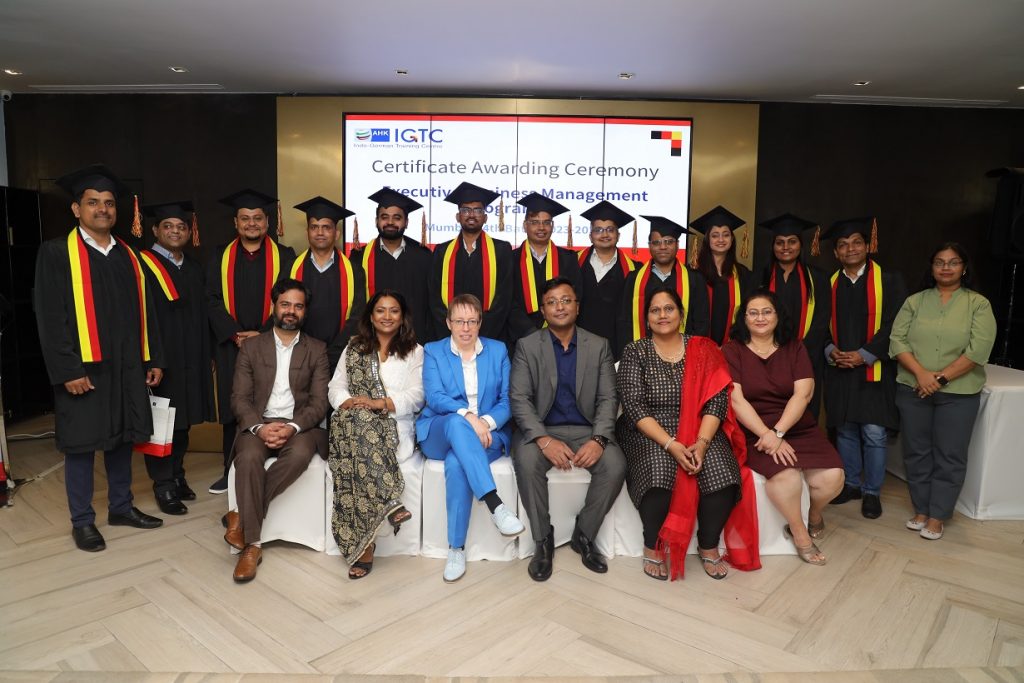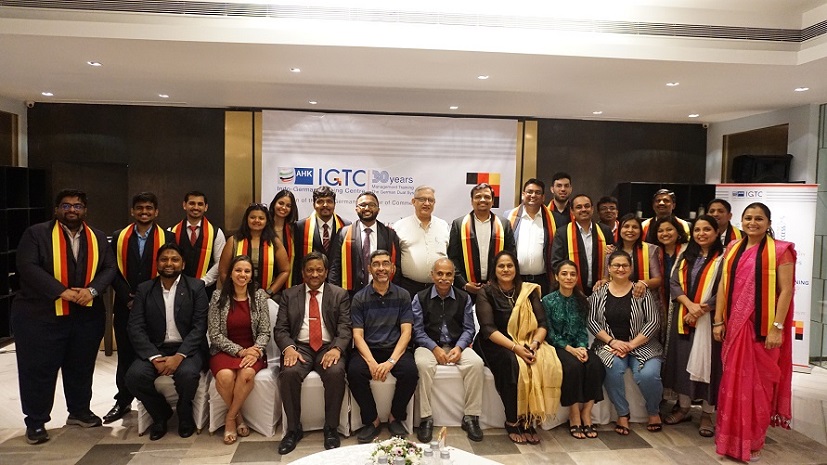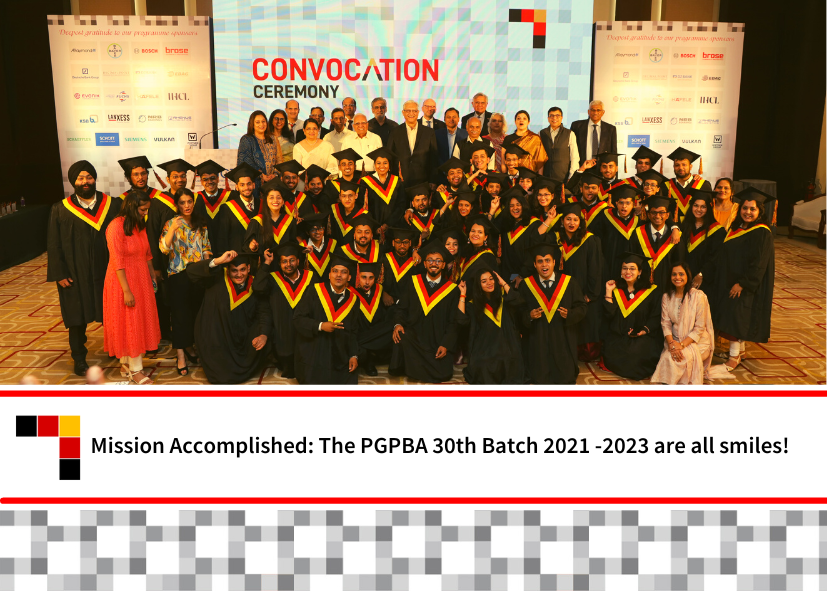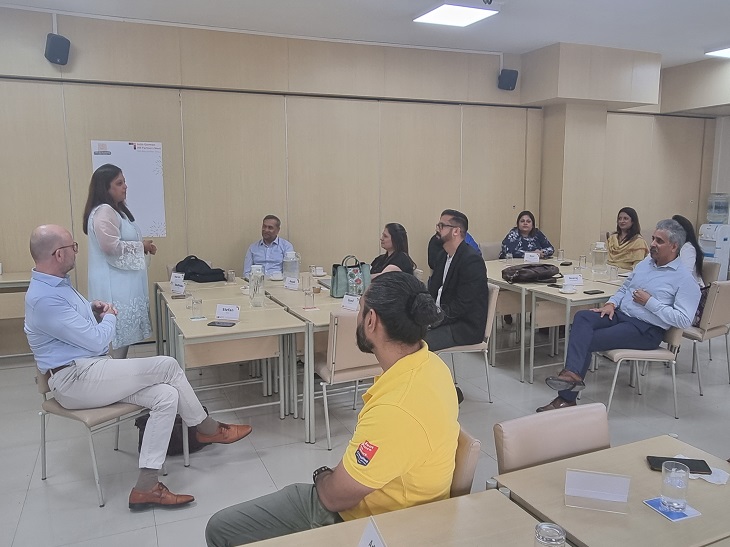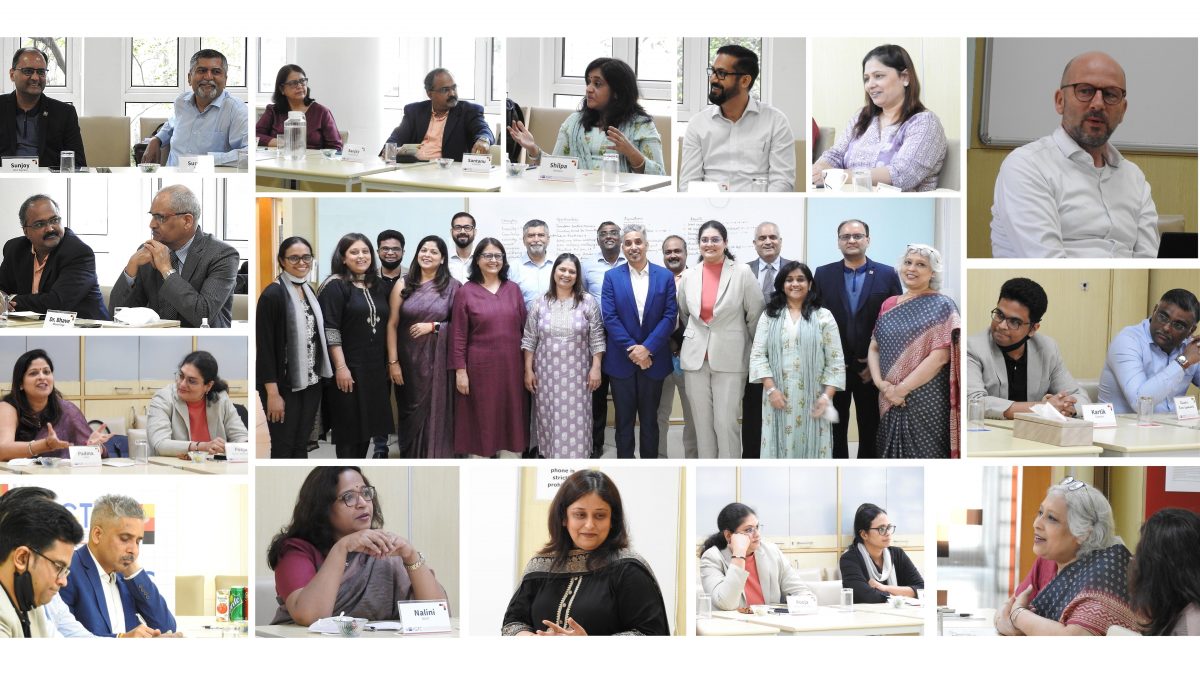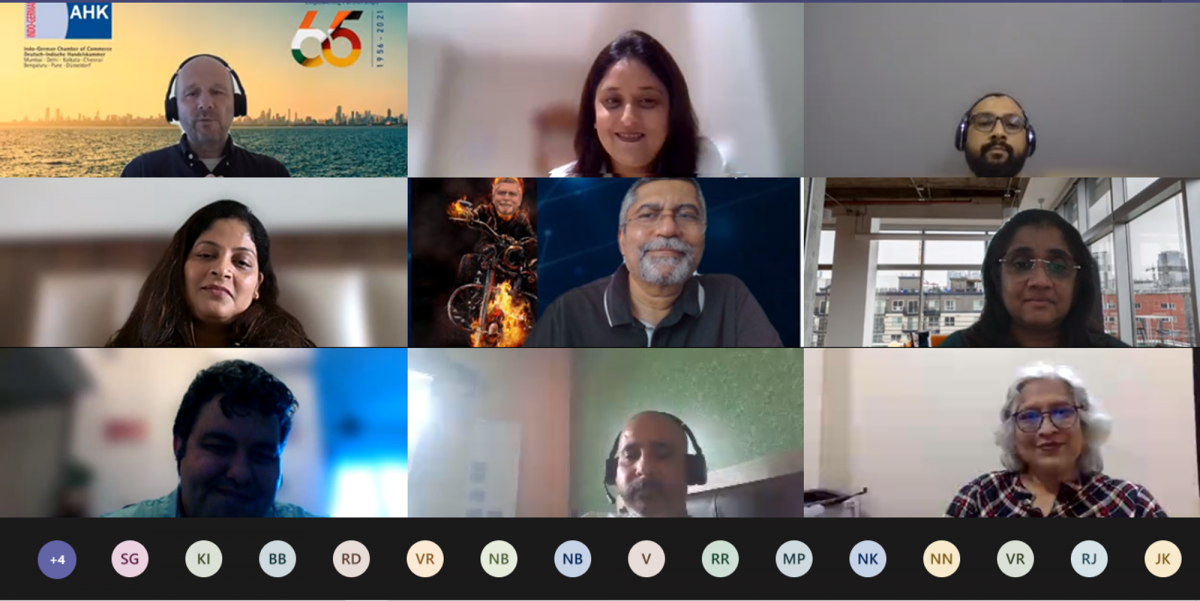On 12th August 2020, 42 HR Partners across 24 organizations connected virtually to engage in a very stimulating dialogue on the ‘Role of HR in Business Continuity during Covid-19’. The virtual Indo-German HR Partner Forum was hosted by Lanxess India Pvt. Ltd.
Neelanjan Banerjee Vice Chairman and Managing Director, Lanxess India launched the partner meet and welcomed all the HR colleagues with his interesting perspective on Business Continuity at Lanxess India. Key takeaways from his address included:
- Lanxess employees remained connected throughout these 150 days of the pandemic including weekends
- Their ‘Performance Culture” is not about ‘what’ you achieve, but also about ‘how’ you achieve it.
- They doubled the mediclaim for every employee, covering both the employee and his/her spouse
- They successfully started manufacturing sanitizers in-house
- For them, the mental wellbeing of the employees was as important as physical wellbeing.
- The top management connected with all employees and spent more than 40 hours with each employee group to know the actual pulse of how the employees were dealing with the situation.
- It was not as much about doing 99 things right, as it was about ensuring that even 1 thing does not go wrong.
The second speaker was Bernhard Steinruecke, Director General, Indo-German Chamber of Commerce. He vehemently thanked the HR partners for their contribution, ideas and motivation to keep the employees engaged, which in turn kept the organizations running. His message was loud and clear: Life has to go on! Corona is not the end of the world. There will be life after Corona. So it is important how we manage ourselves to prepare for that time. Promising full support, he urged the HR partners to reach out to the Chamber if they needed any help, because only then it would be possible to find solutions for their problems.
After the welcome addresses, it was time for the experts to take centre-stage and share their key initiatives, innovations and strategies implemented over the last 4 months to deal with the pandemic. The sharing of best practices was anchored and moderated by Risha Bhattacharya, Head People Management, Lanxess India. Despite being from diverse industry sectors, it was uncanny to see the similarities in the HR interventions of all the German organizations. Only the flavor was different. Probably this is what makes most of them ‘great places to work’.
Key insights shared by Dr Shilpa Kabra Maheshwari, Executive Vice-President and Country HR Head, Siemens India:
- Siemens started early and made a crisis management team that connected leadership to all levels.
- They are going fully digital with leadership learning. The organization jumped to a digital platform ‘My Growth’.
- HR slowed down with hiring but ensured that hiring of all critical positions continued with virtual onboarding.
- Each team member had a buddy to reach out to, a 24 hours well-being helpline platform was established for support, and virtual well-being sessions were conducted.
- They introduced a travel and health app to know the health of all its employees across plants and offices in various locations across the country.
- They reviewed insurance process, tie-ups with hospitals to provide support to employees during the hospitalization process from detection of fever to discharge.
- As an organization, employees follow mindfulness to restrain work calls strictly from 9am to 6pm, no calls during lunch breaks and weekends.
- They have announced ‘work from anywhere’ policy, which enables employees to work for more than 3 days outside of the office, attempt to reduce carbon footprint and hiring across borders.
- They have tied-up with Godrej for furniture to setup office at home, and also provided a platform where employees can purchase PPE kits, thermometers etc
Key insights shared by KS Harish, Country Group HR Head, South East Asia, Bayer Group
- Bayer maintained a very strong crisis management, leadership feedback and first-level manager connect.
- They initiated an extremely effective and unique Resilience Program, which was conducted once a week for 4 weeks. The purpose of this programme was mindfulness, slowing down, focussing energies on one thing at a time, not multitasking, overcoming distractions, taking frequent, short breaks of 1 minute, restraining and bringing down the phone pickups from the current average of 80-100 times a day to 30 times a day. They have subscribed to the Ewaris App to help their employees for mindfulness.
- They initiated Long Service Virtual Awards to appreciate employees, to celebrate their milestones and to induce positivity. This included videos and photographs of good times.
- In keeping with their vision, ‘Health for all, Hunger for none’, they engaged in various Corporate Social Responsibility activities and made heroes of employees who actively participated in these initiatives.
- They set up a purchasing portal for better work-from-home office setup.
- Learning was a big winner at Bayer
- Pulse surveys conducted with contracted labour indicated feedback that 70 – 80% were fine.
- They ensured that trust, empathy and empowerment of all employees.
Key insights shared by Santanu Ghoshal, Vice-President HR, Schaeffler Group:
- Schaeffler launched an initiative wherein 1 leader communicated to all the employees once in 7 days, either through WhatsApp or through the company portal to reward and to keep the positivity high
- In addition to give huge thrust on digitalization of learning; they undertook two strong initiatives to build a learning culture.
- Learning Circles, wherein they took the social learning approach, shared videos and case studies, and brought the community together to discuss it over a short duration of 2-2.5 hours.
- Think Tanks, which was focussed over a longer duration of 2 months on technical training topics with a group of employees and subject matter experts.
- They found it difficult to get the contractual employees back to work
- They focused on mental wellness through extensive use of the Employee Assistance Programme app developed and run by Compsych.
- They launched Corona Kavach with Oriental Insurance, special medical insurance for Covid-19, in addition to the normal medical insurance scheme.
- They recognized that the greatest challenge, going forward, will be long-term workforce management; transition to work from home culture, enabling managers to balance work pressure and empathetic handling of team members. The HR professionals will play an important role in coaching and counselling both managers as well as employees to achieve results.
Key insights shared by Sunil Antony Head HR, Lanxess India:
- In last 6 months of the prevailing pandemic and newer working conditions, LANXESS found innovative ways to reach out to every employee.
- The merit process was concluded successfully, by transitioning into a paperless exercise this year, due to onset of COVID-19 around that time.
- The organization conducted Virtual Employee Engagement activity every Friday to connect not only with all employees but also with their families. This helped significantly to build a better connect, engagement, morale boosting and understanding, due to extended Work from Home office for many employees.
- They did not have programs to deal with mental well-being which leads to stress, depression and loneliness in many employees. Hence, they focused more on programmes around mental and physical well-being under their ‘Health and Well-being’ framework. They also plan to launch the Employee Assistance Programme soon.
Key insights shared by Padma Gupta, Director – Human Resources, Häfele India:
- Hafele has decided Friday as a no meeting day, so that employees get time to do all the pending work
- For junior staff, they have arranged impromptu chai corners to get them in groups to talk, since some of them have not spoken for months.
By the end of the thoroughly engaging 2-hour discussion, it was evident that all the companies had gone through a roller coaster ride. More than brick and mortar, they were made up of flesh and blood, and people management was the biggest intervention required during this turbulent times. The challenge was to reposition the role of HR to manage this intervention. Undoubtedly, it was a time when culture eats strategy for breakfast!
We look forward to our next Indo-German HR Partner Meet on 16th October 2020 to be hosted by Siemens India!


